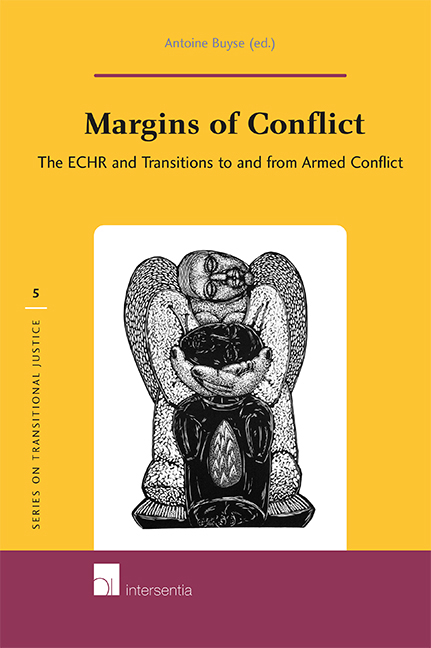Book contents
- Frontmatter
- Preface
- Contents
- Human Rights without Peace? The European Court of Human Rights and Conflicts Between High Contracting Parties
- Crisis Situations, Counter Terrorism and Derogation from the European Convention of Human Rights. A Threat Analysis
- Really Out of Sight? Issues of Jurisdiction and Control in Situations of Armed Conflict under the ECHR
- The Use of Interim Measures Issued by the European Court of Human Rights in Times of War or Internal Conflict
- Foretelling the future, facing the past. Hate speech and conflict situations under the ECHR
- The Duty to Take Preventive Operational Measures. An Adequate Legal Tool to Hold States Responsible in Enforced Disappearance Cases?
- Airborne or Bound to Crash? The Rise of Pilot Judgments and Their Appeal as a Tool to Deal with the Aftermath of Conflict
Human Rights without Peace? The European Court of Human Rights and Conflicts Between High Contracting Parties
Published online by Cambridge University Press: 16 December 2020
- Frontmatter
- Preface
- Contents
- Human Rights without Peace? The European Court of Human Rights and Conflicts Between High Contracting Parties
- Crisis Situations, Counter Terrorism and Derogation from the European Convention of Human Rights. A Threat Analysis
- Really Out of Sight? Issues of Jurisdiction and Control in Situations of Armed Conflict under the ECHR
- The Use of Interim Measures Issued by the European Court of Human Rights in Times of War or Internal Conflict
- Foretelling the future, facing the past. Hate speech and conflict situations under the ECHR
- The Duty to Take Preventive Operational Measures. An Adequate Legal Tool to Hold States Responsible in Enforced Disappearance Cases?
- Airborne or Bound to Crash? The Rise of Pilot Judgments and Their Appeal as a Tool to Deal with the Aftermath of Conflict
Summary
WAR, NEVER AGAIN. NO PEACE WITHOUT HUMAN RIGHTS
Immediately after World War II there was a hope that it might be possible to permanently prevent war and the attendant atrocities in the future. This is reflected in the Charter of the United Nations of 1945, which was intended, in the first place, ‘to save succeeding generations from the scourge of war, which twice in our lifetime has brought untold sorrow to mankind, and to reaffirm faith in fundamental human rights, in the dignity and worth of the human person, in the equal rights of men and women and of nations large and small …’. The Universal Declaration of Human Rights (1948) takes these ambitions further: ‘Whereas it is essential, if man is not to be compelled to have recourse, as a last resort, to rebellion against tyranny and oppression, that human rights should be protected by the rule of law …’.
At the universal level, these aims were elaborated in the Universal Covenants on Civil and Political Rights and on Economic, Social and Cultural Rights (1966). At the European regional level, they were first made tangible by the Statute of the Council of Europe (1949) and the European Convention on Human Rights (1950), later joined by the European Social Charter (1961, revised 1996).
DID THIS SUCCEED?
More than 60 years after the Universal Declaration (1948), in the year of the 60th anniversary of the Statute of the Council of Europe (1949) and the 50th anniversary of the European Court of Human Rights (1959), this Annual SIM1 Lecture offers a good opportunity to review the European balance and make some comments about whether this hope came true. At the world level it is clear that after World War II, war never ended. The number of (civil) wars and atrocious hostilities between peoples seems undiminished, if not increased. Moreover, Europe has not been spared its share of conflict and oppression since 1945. It is possible to see the presence of the Soviet Union in Eastern and Central Europe (until 1989) in such a light. During this time, Europe witnessed the brutal repression of popular uprisings in East Germany (1953), Hungary (1956) and Czechoslovakia (1968).
- Type
- Chapter
- Information
- Margins of ConflictThe ECHR and Transitions to and from Armed Conflict, pp. 1 - 34Publisher: IntersentiaPrint publication year: 2010



